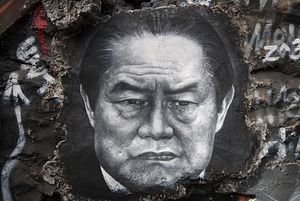The final fall of Zhou Yongkang was dramatic and exciting. Even after over two years of speculation, his formal indictment is big news. Never before has someone so highly ranked been treated this way. Mao Zedong’s Politburo colleagues were removed for political reasons — claims of treachery, counter-revolutionary behavior, or subversion. But a retired super-elite leader charged with corruption is new.
In this context, it’s tempting to personalize the situation and simply claim that Xi is becoming a dictator, ousting those who displease him. Xi always hated Zhou, and particularly so when Zhou stood by Bo Xilai. Other reports speculate that now Xi is gunning for the Shanghai gang, maybe even former president Jiang Zemin. However tempting it is to use these personalized interpretations, they are almost certainly a vast oversimplification.
The more valuable framework for analyzing Zhou’s fall, and that of some of the people around him, would be to step back and remember the joint report issued by the World Bank and the Development Research Center of China’s State Council. The report, entitled “China 2030: Building a Modern, Harmonious and Creative Society,” came in at over 450 pages. It contained key proposals for how the Chinese economy needs to change in the next two decades in order for China to modernize and transition successfully to a high income country.
The date that this report was issued is interesting: February 2012. Only a few days earlier, Wang Lijun had fled Chongqing and taken brief refuge in the U.S. consulate in Chengdu, where he first told the story of the murder of British businessman Neil Heywood at the hands of Bo Xilai’s wife. Wang’s adventure took up everyone’s attention, and crowded out much of the publicity that this important report would normally have received.
Within China, the report was immediately criticized by left wingers, over 1,600 of whom wrote a public letter condemning it for worshiping Western liberal economic models, betraying the socialist legacy of the People’s Republic, and revealing then-Premier Wen Jiabao as anti-Maoist. The letter explicitly complained that Wen had never once mentioned Mao in any recent speeches. But as these were the sort of people that have complained about almost everything since 1978, their protests were barely heeded.
Looking at the report today, and placing it alongside the Third Plenum document issued by top level Party leaders last October, one can see that the “China 2030” report was extremely significant indeed. It was almost tantamount to a manifesto for the new leadership. Developing a strong, regulated finance sector, increasing the rights of the middle class to make them better consumers, addressing China’s key sustainability challenges by reforming industry — all of these reforms were laid out as core objectives in the 2012 report, and all of them figured strongly in the plenum statement 18 months later. Most importantly, both the 2012 report and the 2013 plenum statement agreed that market mechanisms were crucial in order to forge other reforms. Most importantly, the market was crucial to making state-owned enterprises leaner, meaner and more fit.
The new leadership have embedded this idea in their policy in the strongest way possible, by formally stating late last year that marketization is not just beneficial for reform in China, but “necessary.” The authors of the “China 2030” report therefore can say that they predicted well. Their arguments were accepted; their thoughts are now Party and government policy.
What has this got to do with Zhou Yongkang? If there was one figure in the last few years that sat atop a massive state enterprise network, then Zhou was that man. His links with the state petrol industry were well known. But he also had contact, through family, into many other areas in the state nexus, as laid out in a spectacular interactive graph from Caixin. Zhou represented par excellence the attitude that state enterprises are the toys of the Party, to be used as Party elites see fit. Marketization as a means of eroding this vast source of wealth and privilege would have horrified Zhou and his ilk.
Zhou’s formal fall therefore is part of a political story, not a personal one. It is a highly symbolic attack, focused more on an attitude than a person. The “China 2030” report and plenum documents are a statement of political consensus that is now largely accepted. Once we recognize this, it becomes clear that Zhou’s indictment is an episode in a much bigger political story than merely that of the fall of one greedy, loathed and corrupt old man.

































